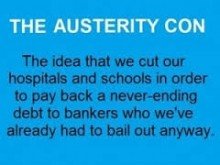The Tory civil war, with all its rancour and ill-feeling, has been a joy to behold! It is not just about Europe, of course, but about the leadership of the Tory Party and an internal clash between two wings of British capitalism. Broadly, the exporters want the EU and the importers want access to cheaper world trade and exports, though there are also clashes between multi-national and small-to-medium enterprises [SME]. Neither of these wings is a friend to the working class: Marx’s phrase “a band of warring brothers” was never more appropriate!
Their selfish divisions do, however, give working people a chance to follow their own interests and push back austerity, which has been revealed as a political strategy, rather than an economic necessity.
It is all woven tightly together in a bundle. The recent discovery of conscience by Ian Duncan Smith is a case in point. His resignation has several sources. The first lies in an ongoing attack on people with disabilities. This, a moral scandal in its own right, has been built on the understanding that the disabled have little economic strength, no ability to fight back and a facility to be “othered” from non-disabled people: just look at the increase in disability-related hate crimes. However, this is starting to change with the increasing (and increasingly effective) organisation of the disabled in groups like DPAC (Disabled People Against the Cuts). The PIP cut was the straw that broke the camel’s back and threatened very real resistance. IDS saw the possibility that he would be blamed for stoking up this fightback, which would have destroyed his chances of grabbing the Tory leadership in the name of Little Englander import/SME capitalism, plus shoring up the Tory Party against a haemorrhage of votes and members to UKIP. Personal, political, economic and tactical reasons all bundled up in a single political act! Which is why his resignation had the effect of a hand grenade in a herd of pigs: a not inappropriate metaphor.
The very real differences between different wings of British capitalism, a system built on semi-organised competition, underlies the seriousness of the split in the Tory ranks. Both wings are aware of the vulnerable position this places their administration in: a narrow majority in Parliament, an effective opposition in Jeremy Corbyn and a massive loss in individual party membership. Their answer to this is to co-opt the increasingly angry working class into one side or other of a European debate that is all about British nationalism on both sides! The debate becomes about the supposed “good” for “Britain” of being in or out of a capitalist club that has no interest whatsoever in the well-being of the British working class; or any other working class for that matter – look at Greece!
As long as the debate remains in this narrow framework, thw working class has nothing to gain on either side, and it’s “business as usual” (and I do mean ‘business’). If we are in the EU, we face imposed austerity, with no democratic route to overthrowing it. If we are out, we face imposed austerity from a cock-a-hoop Cameron with a re-invigorated mandate until 2020.
The TUC, and other unions, have argued that we need the “social chapter” EU provisions to defend trade union rights (have they seen the Trade Union Bill?). This is a coward’s argument. We won trade union rights in Britain before the EU existed, by striking, protesting and occupying. And that is the only way to win back rights now, not by mimicking Oliver Twist’s pathetic “please sir, can I have some more?”. Oliver Twist knew his place, he said “please sir”: I, for one, do not!
So, if we exclude the fast-eroding social chapter (look, again, at Greece) what is good for workers in the EU? Not much. And for workers in an independent UK? Again, not much. So we have to look beyond the “benefits of in or out” debate to locate the real issue for working people.
Look at it this way: why did IDS resign? I would argue that it was the fear of generating a fight that he had a good chance of losing. Does this not show that it is our combativity which is key? Scottish teachers have just won national pay bargaining, including a pay rise of up to 30% [yes, three zero] for the lowest pay, after ONE DAY of strike action, by threatening an escalating programme of action. Grangemouth dockers have beaten off a restructuring (i.e. cut) by picketing out tanker drivers illegally. THIS is where our power is!
Now, does an EU in or out affect this power? Will a beaten Cameron and a bitter, divided Tory Party, accompanied by a probable general election and renewed agitation for an independent Scotland benefit the move towards revived working class organisation and combativity? Of course it bloody would!
And that is why we should campaign for a Left, Internationalist Brexit: not as Oliver Twists, but in the spirit of the revolutionary syndicalists of 1910-1913, in the interests of our class!
Workers’ Britain Out of Europe/Refugees welcome Here/For International Solidarity.
Tim Nicholls












